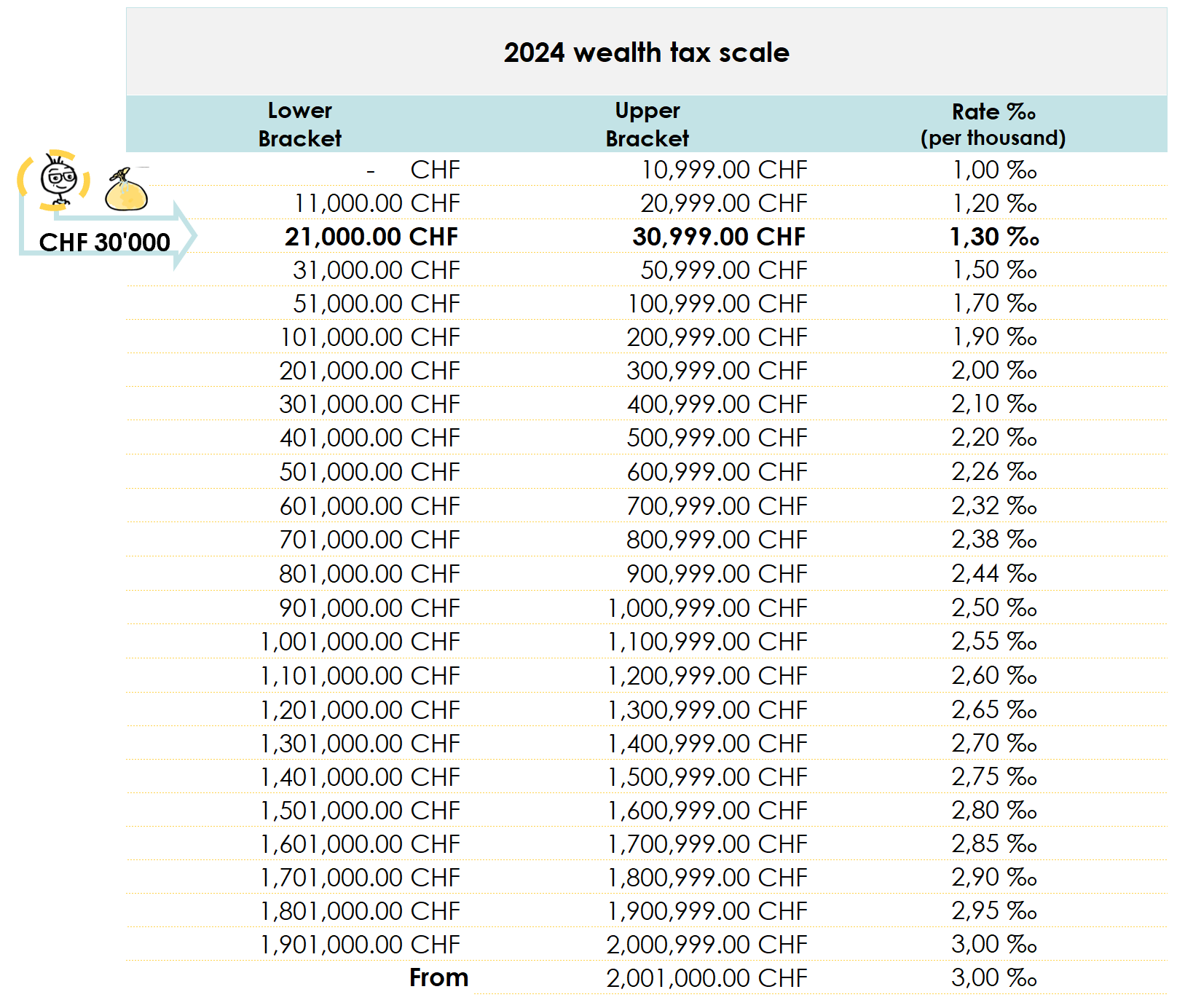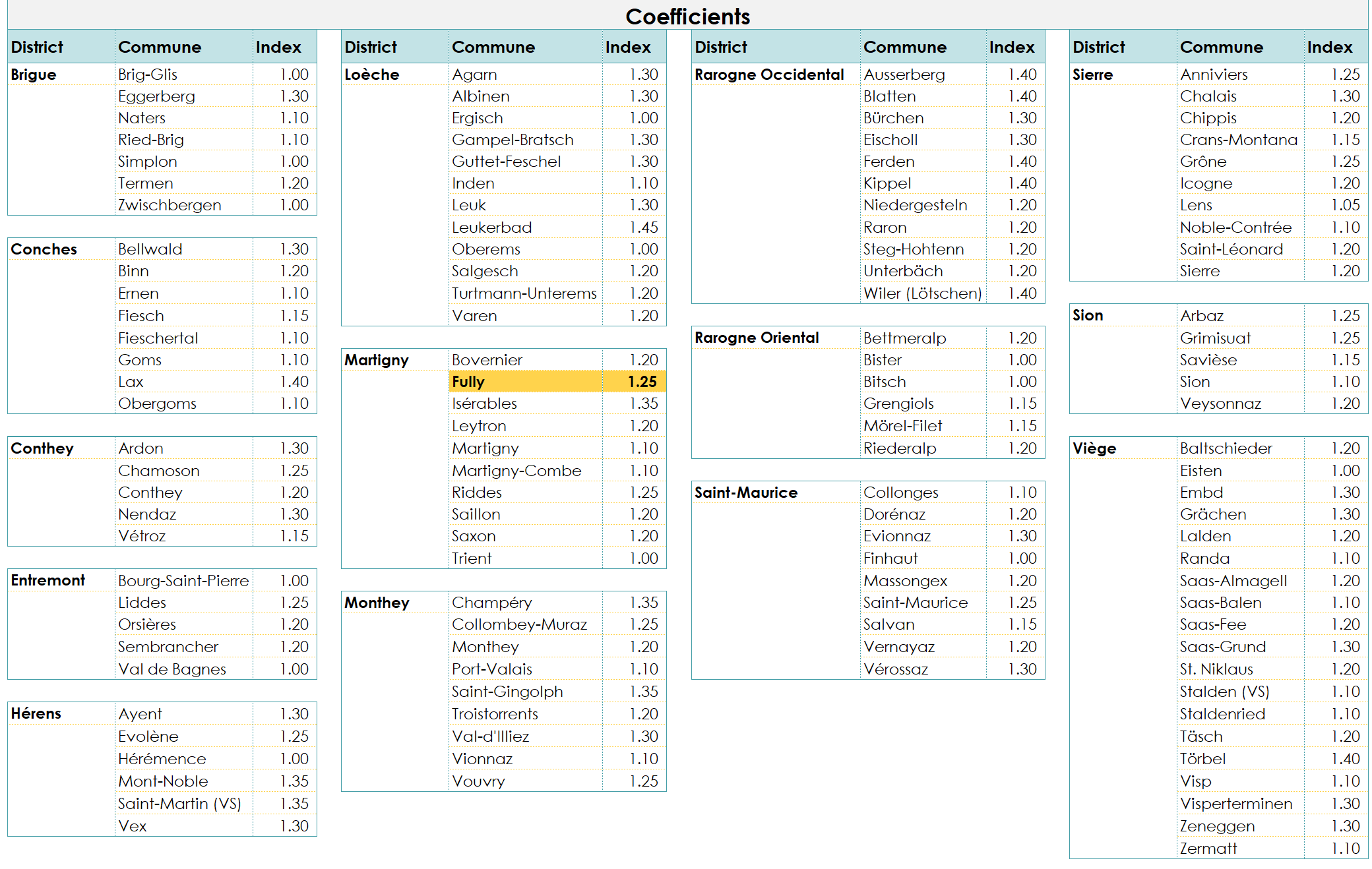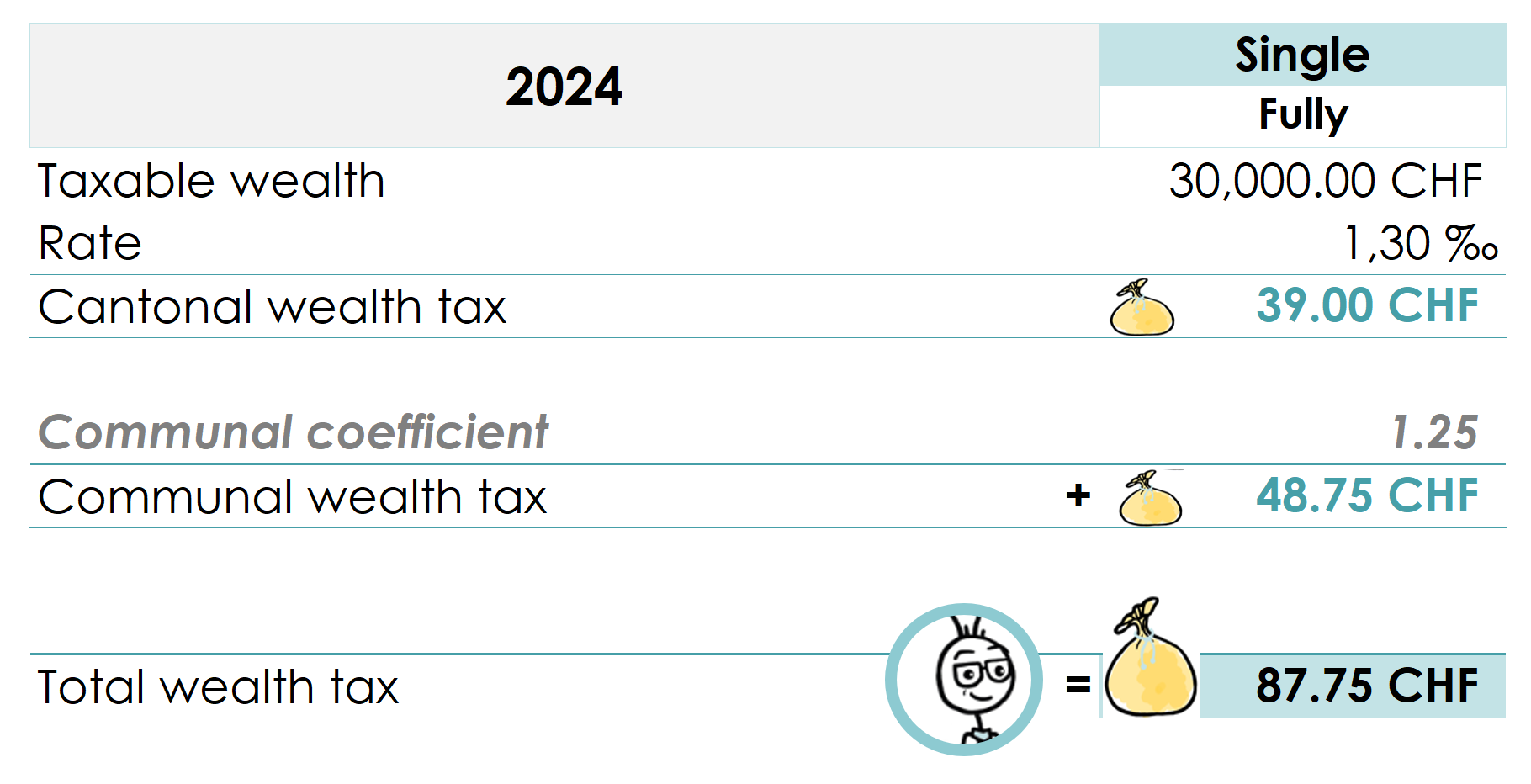 Written by Yanis Kharchafi
Written by Yanis KharchafiUnderstanding Wealth tax in Valais
Worldwide, this form of taxation is being debated and many countries have decided not to tax the capital saved by their taxpayers. Bad luck for the residents of Valais and more generally for the Swiss people as this tax remains applicable in the commune and canton.
Along with communal, cantonal and direct federal income taxes, you will be required to declare your assets and debts in order to be fiscally compliant. By the way, if you need a hand with your tax return in Valais, feel free to ask! 😉
The line-up:
What is considered as wealth in the Valais?
Before diving into the “net worth” concept, I suggest clarifying together what is considered by the relevant tax authorities as an inherent part of your wealth:
Your movable assets
These are any assets that are not immobilized, in other words all except real estate (houses, buildings, and lands of any kind). It includes:
- Bank accounts
- Securities (stocks, bonds)
- Valuable objects
- Life insurance
- Livestock
- And even doubtful receivables as long as you still have a chance to recover the money.
- Etc.
Are excluded from this list the household furniture and the personal items of common use.
Real estate assets
No surprise, if livestock and watches are part of our taxable wealth then so is our real estate.
Please note that when talking about real estate assets, it is important to differentiate :
- the rents that will be taxed as taxable income
- from the fiscal value of the real estate which will be taxed as wealth.
Identify your taxable wealth in Valais
Once this aggregation exercise is completed and the total value of your assets is known, you will be allowed to deduct all the debts (credits and mortgages) for which you’ll probably pay interest.
Besides the deductible debts, the canton of Valais allows a lump-sum deduction not to tax the assets from the first franc. This allowance is determined by your situation and is unlikely to change for the 2024-25 financial year.:
- For single, widowed or divorced persons without children: CHF 30’000.
- For married couples (with or without children) and single persons living in a common household with a dependent child: CHF 60,000.
Now you can claim to know how to calculate your taxable wealth. Quite fancy, isn’t it?
Do we pay a lot of wealth tax in the canton of Valais?
It’s hard to say… What do we mean by “a lot of tax”? Instead of giving you my opinion, I’ll let you form your own judgment through some concrete examples.
Wealth tax in a tax-advantageous commune (e.g., Verbier)
- With a taxable wealth of CHF 50,000: CHF 160, which represents a tax rate of 0.32%
- With a taxable wealth of CHF 100,000: CHF 350, which represents a tax rate of 0.35%
- With a taxable wealth of CHF 500,000: CHF 2,210, which represents a tax rate of 0.442%
- With a taxable wealth of CHF 2,000,000: CHF 12,010, which represents a tax rate of 0.60%
Wealth tax in a tax-disadvantageous commune (e.g., Kippel)
- With a taxable wealth of CHF 50,000: CHF 190, which represents a tax rate of 0.38%
- With a taxable wealth of CHF 100,000: CHF 418, which represents a tax rate of 0.418%
- With a taxable wealth of CHF 500,000: CHF 2,650, which represents a tax rate of 0.53%
- With a taxable wealth of CHF 2,000,000: CHF 14,410, which represents a tax rate of 0.72%
Do these examples help you draw your own conclusions? What we can deduce is that the commune can influence your tax burden. However, regardless of which commune you decide to settle in, your wealth will generally not be taxed at more than 0.72% (applicable for 2025).
In short, now that the numbers are laid out and the die is cast, I invite you to think further and investigate together how we arrived at these figures by carefully breaking down the calculation of wealth tax. Ready?
How is wealth tax calculated in the canton of Valais?
Like for income and in other Swiss cantons, Valais imposes wealth tax first through the canton and then through the municipality of residence.
Calculating the Cantonal Tax
In the first step, the goal is to calculate the cantonal tax. To do this, we need to refer to the table commonly known as: “Schedule 3 – Tabelle 3 Cantonal and communal wealth tax on individuals.” Yes, singular and plural exactly as written.
This table will allow you to easily determine the amount of tax to pay.
The rates range from 1‰ for taxable wealth not exceeding CHF 10,000, up to 3‰ for wealth exceeding CHF 2,000,000. It’s clear that, unlike income tax which is expressed in percentages, here we’re talking about per thousand (which is somewhat reassuring).
Let’s take an example. Suppose I’m a single person with only one asset, a bank account at BCVS, which for once has a fairly decent balance of CHF 60,000 (I’ve cut back on Christmas presents).
First, I must subtract my lump sum of CHF 30,000 to determine my taxable wealth, and then refer to the table to calculate the final cantonal tax.
In this case, it’s pretty simple: CHF 60,000 – CHF 30,000 = CHF 30,000… Now that my taxable wealth is CHF 30,000, I’ll take a look at that famous table.

I should therefore calculate CHF 30,000 x 0.00139, which equals CHF 39 for the canton of Valais. Now you know how to calculate your taxable fortune and determine the cantonal tax.
Calculating the communal tax
I warn you, it’s less pleasant than for the canton. But for those who have endured the calculation of the communal tax (and cantonal) on income tax alongside us, rest assured, we won’t be doing any indexation here, to anyone. However, the process is similar.
Let’s start with what we know. Everything that applied to the canton applies to the commune as well.
The first step is already done: you calculate your taxable fortune, and then you look up the corresponding tax in the table. In our example, CHF 39.
Then comes the commune. In the canton of Valais, each commune decides on a tax coefficient that will be used to increase the tax levied by the canton. Here are the 2024 values:

These coefficients range from 1 (no increase, the cantonal tax is equal to the communal tax) to 1.5 for communes where it’s not favorable to live (fiscally speaking, of course).
If in our example, I reside in Fully, then I would need to multiply my CHF 39 by 1.25, which would give me CHF 48.75 more to pay to the commune of Fully.
In total, I would need to pay CHF 39 to the canton and CHF 48.75 to the commune. This gives us a total of CHF 87.75 for the total wealth tax.

How can FBKConseils help you with your taxes?
A first free consultation
For 2025, we continue to offer anyone the opportunity to book a free consultation of 15 to 30 minutes. This meeting is the perfect opportunity to ask us any questions (yes, really any), and we will take the time to answer them. If you wish, we can also explain our method of work and how we can assist you with your tax procedures.
Tax simulation
After reading our articles, we are confident that you are now well-equipped to perform your own tax simulations in case of life changes. But if you’re short on time or prefer to delegate this task, we would be happy to assist you and help you make the best financial decisions.
Tax returns
At the heart of our profession are taxes. And when it comes to taxes, it inevitably involves tax returns. Every year, we are by your side:
- Either to teach you how to fill out your tax return like a true expert,
- Or to take care of the entire process for you, managing it from start to finish.
The goal? Always to adapt to your needs and provide you with a tailored and efficient service.

